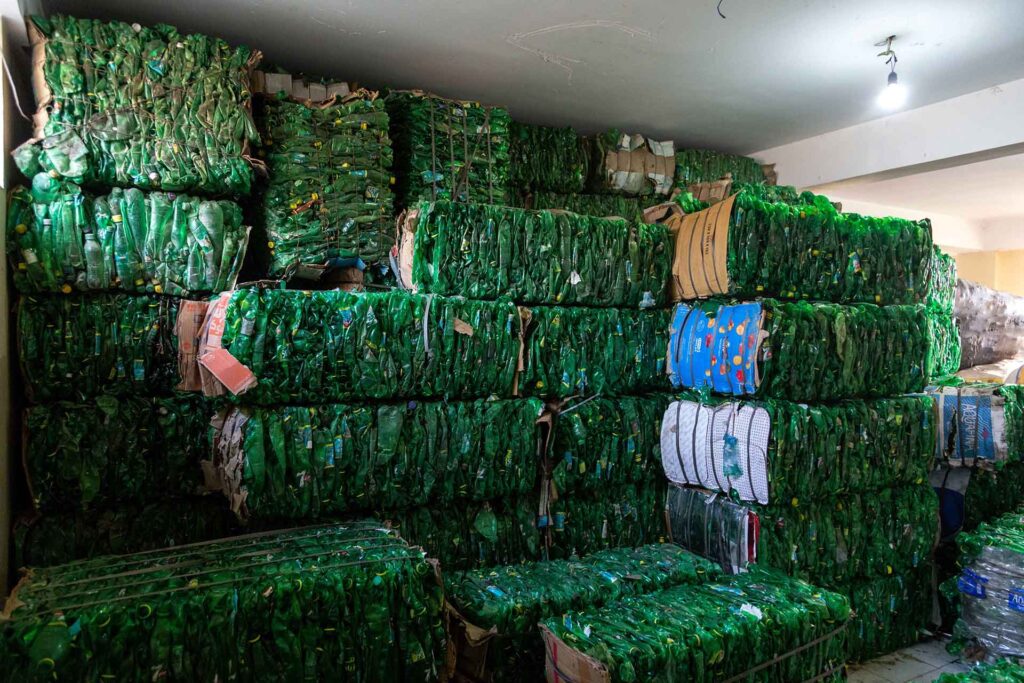Food & Climate
Egypt’s plastic industry is a component of GDP and plays a key role in the country’s economy, providing large number of jobs, as well as feeding many other industries with production components.
The government supports the growth of Egypt’s plastic industry by implementing policies and initiatives to stimulate investment in this sector, enhances competitiveness, and promotes sustainable practices. The government is also developing infrastructure and industrial zones to facilitate the expansion of these industries at all stages.
But Egypt’s plastic industries face many challenges. The most important is the negative environmental impact of plastic waste, of which Egypt generates a large amount. Inadequate waste disposal and inadequate recycling infrastructure have contaminated the environment and waterways with plastic waste, especially those resulting from single-use products, packaging materials, and packaging that are difficult to reuse or recycle.
Effective steps
The Egyptian government is taking effective steps to address this problem by promoting recycling initiatives, investing in waste management infrastructure, raising awareness on the responsible consumption and production of plastic, and adopting circular economy practices.
International organizations such as the United Nation and the World Bank also provide support through initiatives and funding aimed at reducing the leakage of plastic waste into the environment.
At the policy level, the national strategy for reducing the use of single-use plastic bags, centered on significantly reducing consumption of single-use plastic bags by 2030, has been promulgated. This strategy includes promoting recycling and endorsing sustainable alternatives to single-use plastic bags.
Law 202/2020 regulating waste management in Egypt is a comprehensive law aimed at regulating and improving waste management practices in the country.
Article 27 of the law and its executive regulations specifically address the issue of single-use plastic bags and restrict the manufacture and import of plastic bags by adhering to the technical specifications and standards issued by the Ministry of Industry and preventing the free distribution of such bags. The Act also aims to promote the production of environmentally friendly multi-use bags by providing economic incentives for investors and entrepreneurs to produce these alternatives.

In general, Law 202/2020 and its article 27 represent an important step towards reducing plastic waste and promoting sustainable consumption patterns in Egypt, and its success depends on the effective implementation of the executive regulations and the cooperation of various stakeholders, including government, producers, and consumers. Moreover, in coordination with research centers, companies are supposed to play an influential role in this transformation by developing innovative solutions such as biodegradable plastics, smart product designs, and modern recycling programs, along with increasing consumer awareness of the adverse effects of plastic pollution and the importance of preserving the environment and natural resources.
Expectations of change resistance
It is expected that there will be resistance to change from producers and consumers and a refusal to shift both to produce according to the technical specifications and to use multi-use alternatives. This resistance stems from the interplay between economic and social factors as well as the lack of awareness of what enforcement actions and measures will involve.
For producers, the initial resistance to change may be the belief that the production of the traditional plastic bag in accordance to the Egyptian standard ES3040 may require investments in production machines and raw materials and the introduction of new processes in the production stages. This is not true, as the production of the plastic bag according to the requirements of the technical standard is no more than the adjustment of existing production lines.
As for the replacement of conventional raw materials used in the production of a plastic bag with one that has the capacity to degrade according to the Egyptian standard ES8570, it may be fearful of the inability of existing infrastructure and supply chains to keep pace with this shift, making it difficult to integrate alternative materials smoothly into production, consumption, and waste management processes.
Regulatory frameworks and incentives to promote the adoption of sustainable practices in the plastic industry, particularly single-use product alternatives and packaging materials, may also be unclear to companies to stimulate investment in sustainable and environmentally friendly alternatives.
On the other side, consumers resistance to change is often rooted in the ease of handling a lightweight, free-of-charge plastic bag, and the reluctance to adopt new habits, such as acquiring and using multi-use bags or paying for alternatives. Sometimes, the consumer may have a perception that individual actions on his part will not bring about change, leading to a negative handling of the measures.
Furthermore, there may be a lack of awareness or understanding about the long-term economic and environmental consequences of plastic waste. Without clear and consistent public awareness campaigns, consumers may not realize how important this issue is and the urgent need for a change in his behavior towards single use plastic bags.

Resisting change requires a collective and simultaneous effort from producers, consumers, government bodies, and NGOs, as working together can create a more sustainable future in which plastic waste is reduced and human health and the environment are protected. In this regard, it is imperative that the law, resolutions, and regulations be implemented progressively to give producers and consumers time to adapt, ensure compliance, and deter violations. Furthermore, public awareness campaigns are necessary to educate consumers about the negative environmental impact of plastic residues and the benefits of sustainable alternatives.
On the other hand, EPR is one of the effective tools in the fight against plastic pollution, as it is based on holding producers responsible for the management of plastic waste from their products, which motivates them to design recyclable products and reduce the use of single-use and non-recyclable plastic products.
-Dr. Ahmed Abdelkader, Plastic Materials and Polymers Advisor.
Former Director of the Plastic Technology Center in Egypt.
– This article represents the opinion of the writer.

